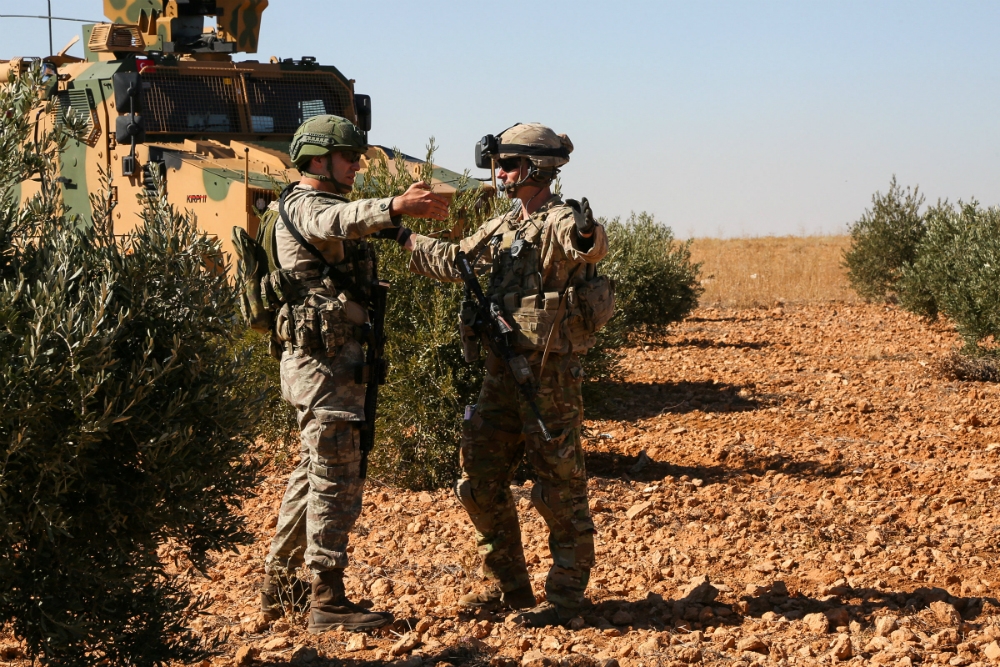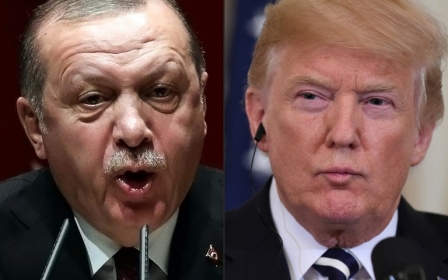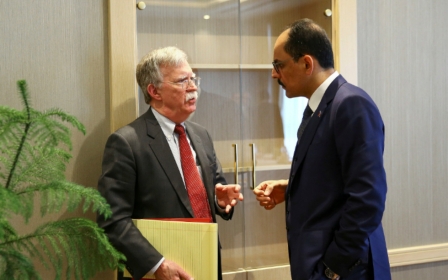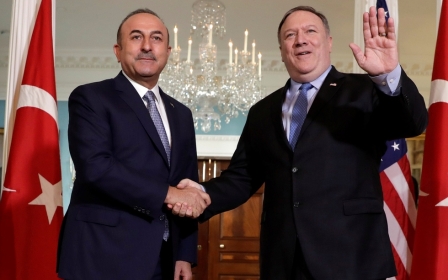Trump and Erdogan in call to patch up row over Syria tensions

Donald Trump and his Turkish counterpart Recep Tayyip Erdogan have discussed ongoing cooperation in Syria, on the heels of the US president's warning that Washington would "devastate Turkey economically" if it launched an attack on Washington's Kurdish allies in the war-torn country.
In a telephone call on Monday, the two leaders discussed "ongoing cooperation in Syria as US forces begin to withdraw", the White House said in a statement.
The two leaders also emphasised the importance of not allowing any parties to block the Trump administration's plan to withdraw about 2,000 US troops from Syria, the Turkish president's office said in a statement of its own.
Trump added on Twitter that they discussed imposing a "20 mile safe zone" in northern Syria, but didn't go into further detail about what exactly that would entail.
Erdogan's office said the Turkish leader reiterated his support for the contentious pullout, which has been panned by some critics who say Washington is abandoning US-backed Kurdish fighters who have been credited with leading the fight against the Islamic State (IS) group in Syria.
The Turkish president also told Trump that Ankara has no problem with Kurds, but takes issue with the Peoples' Protection Unit (YPG), a Kurdish-majority militia that makes up most of the Syrian Democratic Forces (SDF) alliance.
That US support for Kurdish fighters in Syria has been a longstanding point of contention between Trump and Erdogan, as Ankara views the YPG as an offshoot of the banned Kurdistan Workers' Party (PKK), which is designated as a terrorist group by the US and others.
Both leaders emphasised the importance of "healthy" public messaging when it comes to Syria, the Turkish president's office said, hinting at the impact of Trump's tweets on diplomatic relations.
Trump and Erdogan also spoke about the need to complete a roadmap for Manbij, a northern Syria border town that the YPG seized from IS fighters in 2016. The YPG's presence in Manbij has been a source of concern for Turkey, which has staged incursions into Syria in an effort to push the group away from its border.
Turkish-backed forces have held an area bordering Manbij since 2016, and Ankara has repeatedly demanded that the YPG leave the area and cross to the east bank of the Euphrates.
Ongoing US-Turkey tensions
The phone call comes amid heightened tensions between Turkish officials and senior members of the Trump administration over the US withdrawal from Syria, and only one day after Trump threatened to "devastate Turkey economically" if the Turkish army "hit [the] Kurds".
"Starting the long overdue pullout from Syria while hitting the little remaining ISIS territorial caliphate hard, and from many directions," Trump tweeted on 13 January, using another acronym for IS.
On Monday, White House Press Secretary Sarah Huckabee Sanders said Trump also "expressed the desire to work together to address Turkey’s security concerns in northeast Syria while stressing the importance to the United States that Turkey does not mistreat the Kurds and other Syrian Democratic Forces with whom we have fought to defeat ISIS".
US General Joseph Dunford, chairman of the Joint Chiefs of Staff, will meet with his Turkish counterpart on Tuesday, Sanders added, without going into further detail.
Attempts to iron out the details of the US withdrawal from Syria have hit several roadblocks in recent weeks, as senior members of the Trump administration have made contradictory and sometimes inflammatory statements on US intentions following Trump's surprise announcement last month that he planned to end the US's military presence in Syria.
Trump's national security adviser John Bolton was in Turkey earlier this month to discuss the US withdrawal but left without much to show for it.
His visit came shortly after he cautioned Ankara against attacking the Kurds, comments which some observers said led Erdogan to snub him.
Bolton, along with Special Envoy James Jeffrey and Dunford, only met Erdogan’s spokesperson, Ibrahim Kalin, and some Turkish deputy ministers.
Turkish officials told Middle East Eye that Bolton failed to present a clear plan for the US pullout, delivering instead what was described as a "non-paper", an unofficial diplomatic note listing a country's position that is open for discussion.
On Monday, Bolton welcomed the call between Erodan and Trump, describing it as an "excellent conversation" in which the US president reiterated "the consistent US position on standing by the Kurds".
Middle East Eye propose une couverture et une analyse indépendantes et incomparables du Moyen-Orient, de l’Afrique du Nord et d’autres régions du monde. Pour en savoir plus sur la reprise de ce contenu et les frais qui s’appliquent, veuillez remplir ce formulaire [en anglais]. Pour en savoir plus sur MEE, cliquez ici [en anglais].




